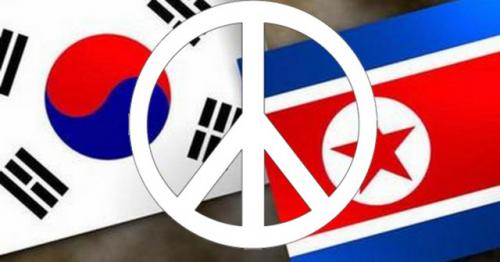Peace in Korea not an impossible dream
- Opinión

Calls for talks made by China and Russia, as well as the worldwide outcry for them, outweighed U.S. threats of war and got the two Koreas to sit down and speak and their dialogue prevailed over the guns, at least for the moment.
Trump’s aggressiveness had to give in to reason, allowing for what seemed the least likely to be achieved on the Korean peninsula: dialogue for the sake of concord, peace and national reunification.
Objectively, because of what has happened so far, the only absolute loser for this universal achievement has been the US imperialist foreign policy. It sees its role as a guarantor of South Korea’s security threatened by a hypothetical danger of absorption by Democratic and Popular Korea, the US pretext for its control strategy in that region of Asia.
What is happening on the Korean peninsula today is the result of Washington’s policy of intimidation and threats of violence against Pyongyang, which has intensified considerably since Trump came to power. However, because of the wonders of imperialist propaganda, the media in the U.S. and the many media outlets around the world that are governed by the enormous financial resources that the world’s top power devotes to this, US pressure is presented as the source of the moves toward dialogue on the peninsula.
It is true that this policy was not invented by the current president, just as it was not he who invented U.S. imperialism, but it is demonstrable that every time a government has responded with concessions to U.S. intimidation, the threats have materialized with the exercise of greater violence. In the Middle East, the centre of Europe and Latin America the evidence of this is abundant.
If the hopes for peace on the Korean peninsula were to be attributed to a positive foreign influence, this could only be credited to the insistence with which Beijing and Moscow have called for a respectful inter-Korean dialogue for a satisfactory solution.
But it is clear that Pyongyang enjoys the national independence that is essential for the achievement of such dialogue, and Seoul, on the other hand, lacks such freedom because of its enormous political and military dependence on the United States.
The extensive and intense US military presence in the south of the Korean peninsula has always been the main obstacle to the efforts for the reunification of the Korean homeland.
The North has never given in to Washington’s demands, and the South has always lacked the necessary autonomy to assert its interests as a formally independent nation, due to the United States’ control over its defenses and military resources.
It was this circumstantial reality that led Pyongyang to propose a totally independent development of its national defence. This includes nuclear weapons and ballistic missiles, productions monopolized by the highly developed nations, in which North Korea made autonomous inroads through enormous sacrifices for its objectives of expanding the material well-being of its people.
Credit goes to South Korean President Moon Jae-in who, since coming to power last May, has sought to bring the North and South Korean governments closer through dialogue and his insistence that Pyongyang participate in the Winter Games was part of that effort. We should recall that in September 2017, President Donald Trump offended Moon, in his usual derogatory remarks, by calling him a “beggar”, for his insistence on dialogue with North Korea.
Many endeavors will have contributed to the achievement of the admirable events announced today in Korea. Al the same time it must be recognized that the wisdom with which the Korean communists have defended the independence of their Homeland has been decisive for the triumph of the Asian nation. It shows that the only way to curb the imperialists’ appetites in the contemporary world is confronting all risks and not by making concessions.
It is hoped that, in the agreed-upon talks, the US President will seek to advance arguments to safeguard its atomic monopoly by calling for the non-proliferation of nuclear weapons as a principle for any agreement. For his part, North Korean Kim will advocate general and total denuclearization as the only form of truly democratic disarmament.
If it succeeds in achieving this goal, the much-vaunted Democratic People’s Republic of Korea will have laid the foundations for a lesson that the heroic Argentine and Cuban guerrilla fighter Ernesto Che Guevara always advocated: “Imperialism cannot be granted concessions, not even a little bit like this, nothing”.
April 30, 2018.
Translated and edited by Walter Lippmann and ALAI.
Del mismo autor
- ¿Por qué la sostenida popularidad de Trump? 20/07/2020
- Ya no es la economía, estúpido, es el virus 15/07/2020
- De qué no será capaz Trump para reelegirse 02/06/2020
- The Capitalist Crisis is Worse than Covid-19 26/05/2020
- Refutación del fundamentalismo religioso 19/05/2020
- Precedents in Cuba of “Operation Gideon” 16/05/2020
- Precedentes en Cuba de la Operación Gedeón 14/05/2020
- Los grandes perdedores del Super Bowl 18/02/2020
- El papel del miedo en las elecciones de EEUU 11/02/2020
- Impacto de Trump en la juventud de EEUU 24/01/2020
Clasificado en
Clasificado en:
Guerra y Paz
- Prabir Purkayastha 08/04/2022
- Prabir Purkayastha 08/04/2022
- Adolfo Pérez Esquivel 06/04/2022
- Adolfo Pérez Esquivel 05/04/2022
- Vijay Prashad 04/04/2022
